大学英语三级语法大全-II
[实用参考]大学英语三级考试语法总结.ppt
![[实用参考]大学英语三级考试语法总结.ppt](https://img.taocdn.com/s3/m/a309f9bef705cc175427091c.png)
指物
which that
which /that/zero
非限制性关系分句
指人
指物
who/whom/ whose
which
作介 词补 足成
分
whom
which
定语从句中关系副词的选择
1. when 表示时间 2. where表示地点 3. why表示原因 它们在定语从句中都充当状语成分。
练习题:
1.The advertising company recently hired a designer ____ had once won a prize in a national contest. A. whose B. which C. whom D. who
大学英语三级考试语法总结
• 语法考题的涉及面宽
• 近年考题出现频率最高的:几乎所有词类, 三种动词的非谓语形式,名词从句,形容 词从句,副词从句,独立主格,主谓一致, 倒装,强调,虚拟语气等基本语法知识。
• 语法考试的重点突出
• 语法考试的重点为内容庞杂较难掌握的项 目,这些项目有时还会反复出现如:虚拟 语气,状语从句,定语从句,独立主格, 情态动词。
5. It was not such a good job ____ she had read about in the advertisement. A. like B. which C. as D. what
状语从句
1. 时间状语从句
词例 含义
当…时候 在…之前
when, while , as before
• 一、形容词性从句概要
• 定义:形容词性从句一般称为定语从句,在句 子中起定语作用,修饰一个名词或代词,有时 可修饰一个句子。
2016年成人英语三级考试重点短语语法二
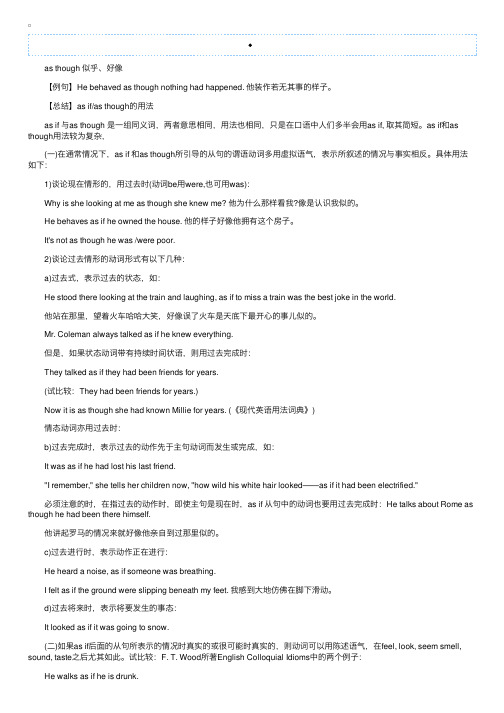
as though 似乎、好像 【例句】He behaved as though nothing had happened. 他装作若⽆其事的样⼦。
【总结】as if/as though的⽤法 as if 与as though 是⼀组同义词,两者意思相同,⽤法也相同,只是在⼝语中⼈们多半会⽤as if, 取其简短。
as if和as though⽤法较为复杂, (⼀)在通常情况下,as if 和as though所引导的从句的谓语动词多⽤虚拟语⽓,表⽰所叙述的情况与事实相反。
具体⽤法如下: 1)谈论现在情形的,⽤过去时(动词be⽤were,也可⽤was): Why is she looking at me as though she knew me? 他为什么那样看我?像是认识我似的。
He behaves as if he owned the house. 他的样⼦好像他拥有这个房⼦。
It's not as though he was /were poor. 2)谈论过去情形的动词形式有以下⼏种: a)过去式,表⽰过去的状态,如: He stood there looking at the train and laughing, as if to miss a train was the best joke in the world. 他站在那⾥,望着⽕车哈哈⼤笑,好像误了⽕车是天底下最开⼼的事⼉似的。
Mr. Coleman always talked as if he knew everything. 但是,如果状态动词带有持续时间状语,则⽤过去完成时: They talked as if they had been friends for years. (试⽐较:They had been friends for years.) Now it is as though she had known Millie for years. (《现代英语⽤法词典》) 情态动词亦⽤过去时: b)过去完成时,表⽰过去的动作先于主句动词⽽发⽣或完成,如: It was as if he had lost his last friend. "I remember," she tells her children now, "how wild his white hair looked——as if it had been electrified." 必须注意的时,在指过去的动作时,即使主句是现在时,as if 从句中的动词也要⽤过去完成时:He talks about Rome as though he had been there himself. 他讲起罗马的情况来就好像他亲⾃到过那⾥似的。
大学英语三级B级-词汇与语法(二)
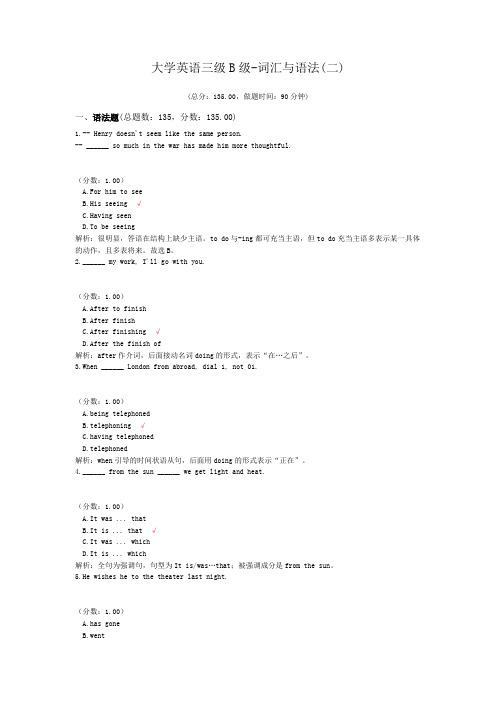
大学英语三级B级-词汇与语法(二)(总分:135.00,做题时间:90分钟)一、语法题(总题数:135,分数:135.00)1.-- Henry doesn't seem like the same person.-- ______ so much in the war has made him more thoughtful.(分数:1.00)A.For him to seeB.His seeing √C.Having seenD.To be seeing解析:很明显,答语在结构上缺少主语。
to do与-ing都可充当主语,但to do充当主语多表示某一具体的动作,且多表将来。
故选B。
2.______ my work, I'll go with you.(分数:1.00)A.After to finishB.After finishC.After finishing √D.After the finish of解析:after作介词,后面接动名词doing的形式,表示“在…之后”。
3.When ______ London from abroad, dial 1, not 01.(分数:1.00)A.being telephonedB.telephoning √C.having telephonedD.telephoned解析:when引导的时间状语从句,后面用doing的形式表示“正在”。
4.______ from the sun ______ we get light and heat.(分数:1.00)A.It was ... thatB.It is ... that √C.It was ... whichD.It is ... which解析:全句为强调句,句型为It is/was…that;被强调成分是from the sun。
5.He wishes he to the theater last night.(分数:1.00)A.has goneB.wentC.had gone √D.would解析:考查虚拟语气。
最新大学英语三级语法知识总结汇总
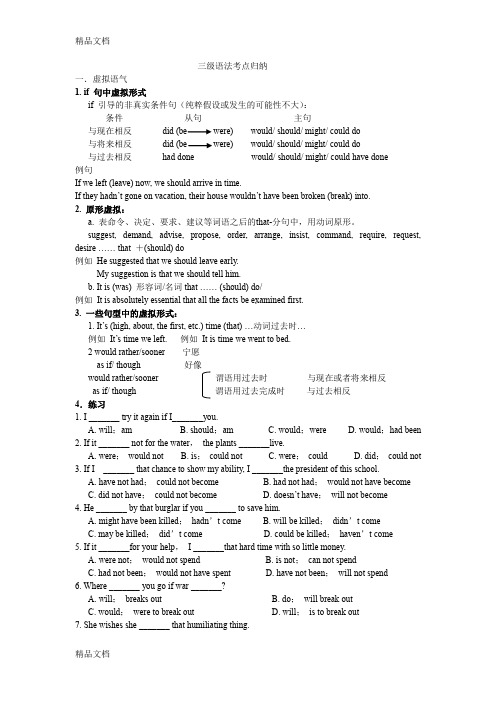
三级语法考点归纳一.虚拟语气1. if 句中虚拟形式if 引导的非真实条件句(纯粹假设或发生的可能性不大):条件从句主句与现在相反did (be were) would/ should/ might/ could do与将来相反did (be were) would/ should/ might/ could do与过去相反had done would/ should/ might/ could have done例句If we left (leave) now, we should arrive in time.If they hadn’t gone on vacation, their house wouldn’t have been broken (break) into.2. 原形虚拟:a. 表命令、决定、要求、建议等词语之后的that-分句中,用动词原形。
suggest, demand, advise, propose, order, arrange, insist, command, require, request, desire …… that +(should) do例如He suggested that we should leave early.My suggestion is that we should tell him.b. It is (was) 形容词/名词that …… (should) do/例如It is absolutely essential that all the facts be examined first.3. 一些句型中的虚拟形式:1. It’s (high, about, the first, etc.) time (that) …动词过去时…例如It’s time we left.例如It is time we went to bed.2 would rather/sooner 宁愿as if/ though 好像would rather/sooner 谓语用过去时与现在或者将来相反as if/ though 谓语用过去完成时与过去相反4.练习1. I _______ try it again if I_______you.A. will;amB. should;amC. would;wereD. would;had been2. If it _______ not for the water,the plants _______live.A. were;would notB. is;could notC. were;couldD. did;could not3. If I _______ that chance to show my ability, I _______the president of this school.A. have not had;could not becomeB. had not had;would not have becomeC. did not have;could not becomeD. doesn’t have;will not become4. He _______ by that burglar if you _______ to save him.A. might have been killed;hadn’t comeB. will be killed;didn’t comeC. may be killed;did’t comeD. could be killed;haven’t come5. If it _______for your help,I _______that hard time with so little money.A. were not;would not spendB. is not;can not spendC. had not been;would not have spentD. have not been;will not spend6. Where _______ you go if war _______?A. will;breaks outB. do;will break outC. would;were to break outD. will;is to break out7. She wishes she _______ that humiliating thing.A. doesn’t doB. didn’t doC. haven’t doneD. hadn’t done8. The chairman suggested that the meeting _______ put off.A. can beB. beC. isD. will be9. It is vital that he _______ immediately.A. should goB. must goC. goesD. went10. It is time we _______do our homework.A. begin toB. can begin toC. began toD. will begin to答案:1.选C。
大学英语三级考试语法复习要点总结
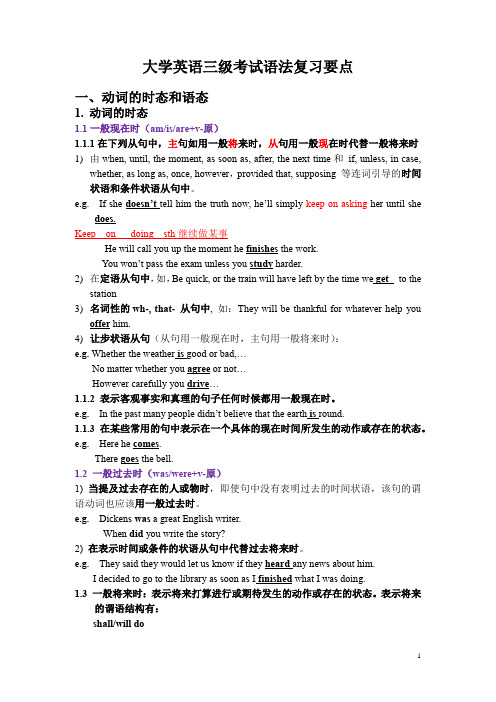
大学英语三级考试语法复习要点一、动词的时态和语态1. 动词的时态1.1一般现在时(am/is/are+v-原)1.1.1在下列从句中,主句如用一般将来时,从句用一般现在时代替一般将来时1)由when, until, the moment, as soon as, after, the next time和if, unless, in case,whether, as long as, once, however,provided that, supposing 等连词引导的时间状语和条件状语从句中。
e.g. If she doesn’t tell him the truth now, he’ll simply keep on asking her until shedoes.Keep on doing sth继续做某事He will call you up the moment he finishes the work.You won’t pass the exam unless you study harder.2)在定语从句中,如,Be quick, or the train will have left by the time we get to thestation3)名词性的wh-, that-从句中, 如:They will be thankful for whatever help youoffer him.4)让步状语从句(从句用一般现在时,主句用一般将来时):e.g. Whether the weather is good or bad,…No matter whether you agree or not…However carefully you drive…1.1.2 表示客观事实和真理的句子任何时候都用一般现在时。
e.g.In the past many people didn’t believe that the earth is round.1.1.3 在某些常用的句中表示在一个具体的现在时间所发生的动作或存在的状态。
大学英语精读第三册第二单元讲义

大学英语精读第三册第二单元讲义Unit 2 Book 3I. Words and Expressions1. hold on: continue in spite of difficulties*Despite all the hardships, he held on to his pursuit of further study abroad.在经济衰退时期我们要把业务坚持下去。
(=We should hold on to our business during the recession.)2. defy: vt.(1) to make impossible or unsuccessful*This problem defied solution. 此问题无法解决。
那个恐怖的场景难以描述。
(=That horrible scene defied any description.)(2) to refuse to obey(=They defied their parents and got married.)这些无视法律的罪犯终于得到了惩罚。
(=These criminals who had defied the law were eventually punished.)Collocations:defy the authority反抗权威defy the government蔑视政府defy severe cold不畏严寒defy enumeration不胜枚举defy laws human and divine无法无天CF. oppose, defy & resist这些动词均含有“反抗”、“抵抗”之意。
oppose 普通用词,可表不同程度的抵抗。
defy 指公开地、勇敢地反对或抵抗,有时含公然挑衅之意。
resist 指积极地反抗一种攻击、暴力或诱惑。
(Directions:) Fill in the blanks with the words above. Change the form where necessary.(1) Our troopers are _______ the enemies’ atta cks.(=resisting)(2) This new plan has been stubbornly ______ since it was put forward. (=opposed)(3) The little boy couldn’t ______ the temptation and ate up all the cake. (=resist)(4) He _____ the court order by leaving the country. (=defied)3. overwhelming: adj. overpowering in effect or strength*The girl screamed with overwhelming joy at the sight of her birthday present, a pink dress.巨大的压力终于让他精神崩溃了。
英语三级语法
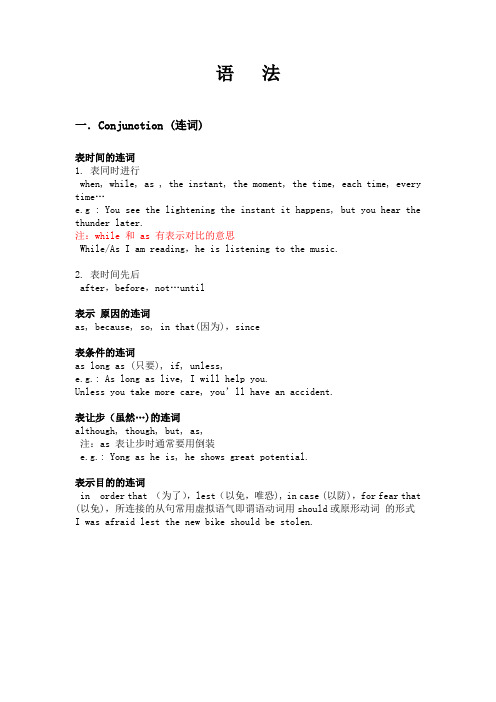
语法一.Conjunction (连词)表时间的连词1. 表同时进行when, while, as , the instant, the moment, the time, each time, every time…e.g : You see the lightening the instant it happens, but you hear the thunder later.注:while 和 as 有表示对比的意思While/As I am reading,he is listening to the music.2. 表时间先后after,before,not…until表示原因的连词as, because, so, in that(因为),since表条件的连词as long as (只要), if, unless,e.g.: As long as live, I will help you.Unless you take more care, you’ll have an accident.表让步(虽然…)的连词although, though, but, as,注:as 表让步时通常要用倒装e.g.: Yong as he is, he shows great potential.表示目的的连词in order that (为了),lest(以免,唯恐), in case (以防),for fear that (以免),所连接的从句常用虚拟语气即谓语动词用should或原形动词的形式I was afraid lest the new bike should be stolen.二.虚拟语气1. 条件句的虚拟语气表示与现在事实相反,if 从句的谓语动词用一般过去时,主句的谓语动词用should, would, could, might 等加动词原形。
I wouldn’t buy the book if I were you.表示与过去事实相反,if 从句的谓语动词用过去完成时,主句的谓语动词用should, would, could, might 等加动词完成时。
大学英语三级语法大全

大学英语三级语法大全名词性从句概述名词性从句在句子中起名词作用的句子叫名词从句 (Noun Clauses)。
名词从句的功能相当于名词词组, 它在复合句中能担任主语、宾语、表语、同位语、介词宾语等,因此根据它在句中不同的语法功能,名词从句又可分别称为主语从句、宾语从句、表语从句和同位语从句。
引导名词性从句的连接词引导名词性从句的连接词引导名词性从句的连接词可分为三类:连接词:that, whether, if(不充当从句的任何成分)连接代词:what, whatever, who, whoever, whom, whose, which.连接副词:when, where, how, why不可省略的连词:1. 介词后的连词2. 引导主语从句和同位语从句的连词不可省略。
What she was chosen made us very happy.We heard the news that our team had won.比较:whether与if 均为"是否"的意思。
但在下列情况下,whether 不能被if 取代:1. whether引导主语从句并在句首2. 引导表语从句3. whether从句作介词宾语4. 从句后有"or not"Whether he will come is not clear.大部分连接词引导的主语从句都可以置于句末,用 it充当形式主语。
It is not important who will go.It is still unknown which team will win the match.名词性wh-从句名词性wh-从句1)由wh-词引导的名词从句叫做名词性wh-从句。
Wh-词包括who, whom,. whose, whoever, what, whatever, which, whichever等连接代词和where, when, how, why等连接副词。
- 1、下载文档前请自行甄别文档内容的完整性,平台不提供额外的编辑、内容补充、找答案等附加服务。
- 2、"仅部分预览"的文档,不可在线预览部分如存在完整性等问题,可反馈申请退款(可完整预览的文档不适用该条件!)。
- 3、如文档侵犯您的权益,请联系客服反馈,我们会尽快为您处理(人工客服工作时间:9:00-18:30)。
大学英语三级语法大全 II倒装:倒装句之全部倒装全部倒装是只将句子中的谓语动词全部置于主语之前。
此结构通常只用于一般现在时和一般过去时。
常见的结构有:1) here, there, now, then, thus等副词置于句首,谓语动词常用be, come,go, lie, run等表示来去或状态的动词。
例如:Then came the chairman. 那时总裁来了。
Here is your letter. 你的信。
2)表示运动方向的副词或地点状语置于句首,谓语表示运动的动词。
例如:Out rushed a missile from under the bomber. 轰炸机肚底下窜出一枚导弹。
Ahead sat an old woman. 前面坐着一个老妪。
注意:上述全部倒装的句型结构的主语必须是名词,如果主语是人称代词则不能完全倒装。
例如:Here he comes. 他来了。
Away they went. 他们走开了。
倒装:以否定词开头作部分倒装否定词如 Not only…but also, Hardly/Scarcely…when, No sooner… than等放在句首,后面要用倒装。
例如:Not only did he refuse the gift, he also severely criticized the sender.他没有收下礼物,还狠狠批评了送礼的人。
Hardly had she gone out when a student came to visit her. 她刚出门,就有个学生来访。
No sooner had she gone out than a student came to visit her. 她刚出门,就有个学生来访。
典型例题No sooner___ than it began to rain heavily.A. the game beganB. has the game begunC. did the game beginD. had the game begun答案 D. 以具有否定意义的副词放在句首时,一般采用倒装句(谓语前置)。
这类表示否定意义的词有never, seldom, scarcely, little, few, not, hardly,以及not only…but (also), no sooner…than, hardly… when scarcely… when 等等。
注意:只有当Not only… but also连接两个分句时,才在第一个分句用倒装结构。
如果置于句首的Not only… but also仅连接两个并列词语,不可用倒装结构,如Not only you but also I am fond of music.倒装:倒装句之部分倒装部分倒装是指将谓语的一部分如助动词或情态倒装至主语之前。
如果句子的谓语没有助动词或情态动词,则需添加助动词do, does或did,并将其置于主语之前。
1)句首为否定或半否定的词语,如no, not, never, seldom, little, hardly,at no time, in no way, not until…等。
例如:Never have I seen such a performance. 从未见过如此糟糕的表演。
Nowhere will you find the answer to this question. 无论如何你不会找到这个问题的答案的。
Not until the child fell asleep did the mother leave the room. 母亲一直到孩子入睡后离开房间。
当Not until引出主从复合句,主句倒装,从句不倒装。
注意:如否定词不在句首不倒装。
例如:I have never seen such a performance.The mother didn't leave the room until the child fell asleep.典型例题1)Why can't I smoke here?At no time___ in the meeting-roomA. is smoking permittedB. smoking is permittedC. smoking is it permittedD. does smoking permit答案A. 这是一个倒装问题。
当否定词语置于句首以表示强调时,其句中的主谓须用倒装结构。
这些否定词包括no, little, hardly, seldom, never, not only, not until 等。
本题的正常语序是 Smoking is permitted in the meeting-room at no time.2) Not until the early years of the 19th century ___ what heat is.A. man did knowB. man knowC. didn't man knowD. did man know答案D. 看到Not until…的句型,我们知道为一倒装句,答案在C,D 中选一个。
改写为正常语序为,Man did not know what heat is until the early years of the 19th. 现在将not提前,后面就不能再用否定了,否则意思就变了。
倒装:only在句首倒装的情况Only in this way, can you learn English well. 只有这样,你才能学好英语。
Only after being asked three times did he come to the meeting. 叫了三次,他才来参加会议。
如果句子为主从复合句,则主句倒装,从句不倒装。
例如:Only when he is seriously ill does he ever stay in bed. 病得狠重时,他才卧床休息。
倒装:so, neither, nor作部分倒装用这些词表示"也"、"也不" 的句子要部分倒装。
例如:Tom can speak French. So can Jack. 汤姆会讲法语,杰克也会。
If you won't go,neither will I.你不去,我也不去。
典型例题——Do you know Jim quarrelled with his brother?——I don't know, _____.A. nor don't I careB. nor do I careC. I don't care neitherD. I don't care also答案:B. nor为增补意思"也不关心",因此句子应倒装。
A错在用 don't 再次否定,C neither 用法不对且缺乏连词。
D缺乏连词。
注意:当so引出的句子用以对上文容加以证实或肯定时,不可用倒装结构。
意为"的确如此".例如:Tom asked me to go to play football and so I did. 汤姆邀我去踢球,我去了。
——It's raining hard.——So it is. 雨下得真大。
是呀。
倒装:as, though引导的倒装句as / though引导的让步从句必须将表语或状语提前(形容词,副词,分词,实义动词提前)。
但需注意:1)句首名词不能带任何冠词。
2)句首是实义动词,其他助动词放在主语后。
如果实义动词有宾语和状语,随实义动词一起放在主语之前。
例如:Try hard as he will, he never seems able to do the work satisfactorily. 他工作很努力,但总不能让人满意。
注意:让步状语从句中,有though,although时,后面的主句不能有but,但是 though 和yet可连用。
倒装:其他部分倒装1) so… that 句型中的so 位于句首时,需倒装。
例如:So frightened was he that he did not dare to move an inch. 他害怕得很,动也不敢动。
2)在某些表示祝愿的句型中。
例如:May you all be happy. 愿你们都快乐。
3)在虚拟语气条件句中从句谓语动词有were, had, should等词,可将if 省略,把 were, had, should 移到主语之前,采取部分倒装。
例如:Were I you, I would try it again. 我是你的话,就再试一次。
典型例题:1)Not until the early years of the 19th century___ what heat is.A. man did knowB. man knewC. didn't man knowD. did man know答案为D. 否定词Not在句首,要求用部分倒装的句子结构。
2)Not until I began to work ___ how much time I had wasted.A. didn't I realizeB. did I realizeC. I didn't realizeD. I realize答案为B.3) Do you know Tom bought a new car?I don't know, ___.A. nor don't I careB. nor do I careC. I don't care neitherD. I don't care also答案为B. 句中的nor引出部分倒装结构,表示"也不".由 so, neither, nor引导的倒装句,表示前一情况的重复出现。
其中, so用于肯定句,而 neither, nor 用在否定句中。
动词的时态:用于现在完成时的句型1)It is the first / second time…… that…结构中的从句部分,用现在完成时。
例如: It is the first time that I have visited the city. 这是我第一次访问这城市。
This is the first time (that) I've heard him sing. 这是我第一次听他唱歌。
